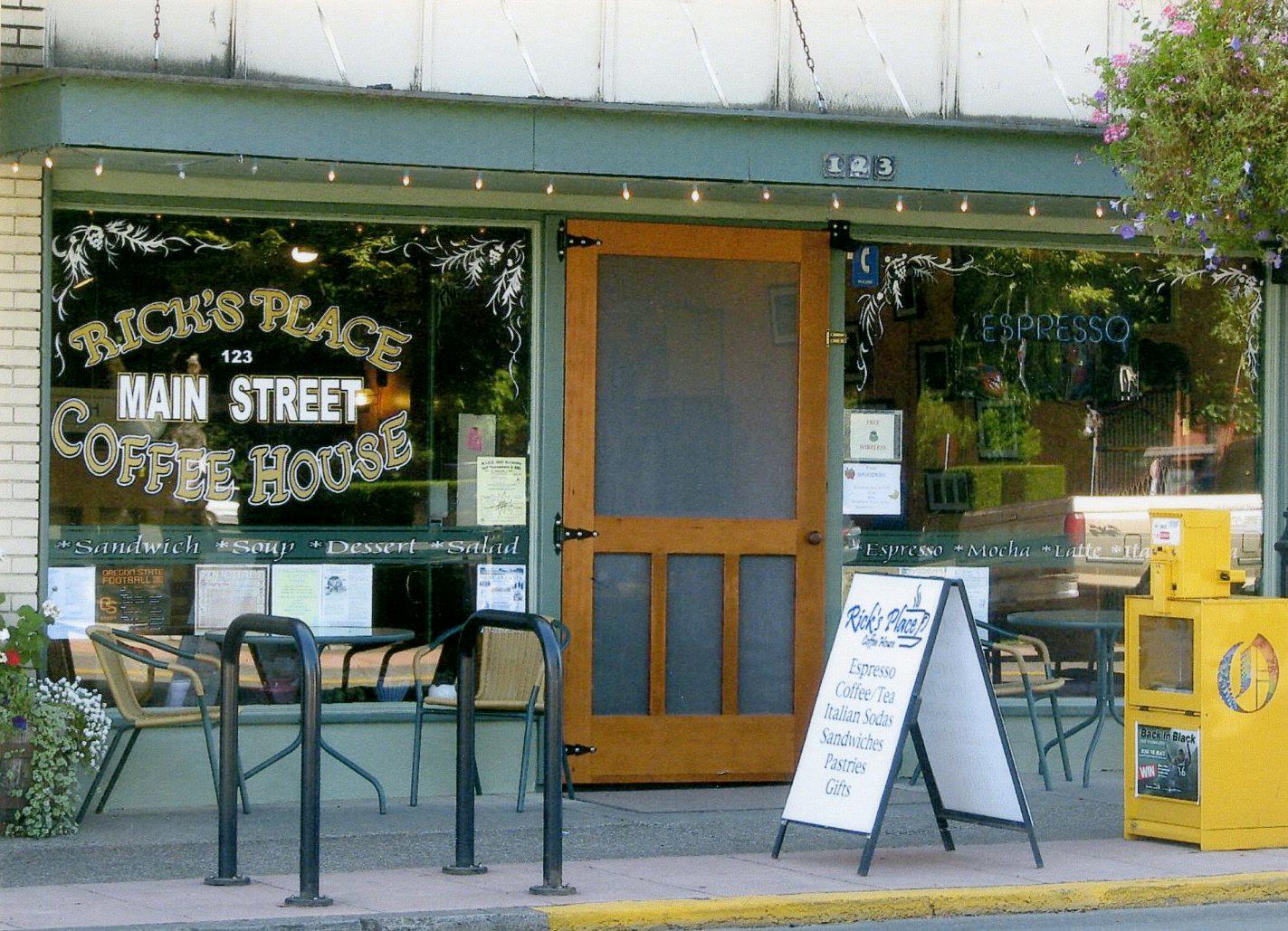How mom-and-pop businesses can thrive in the 21st century
Part of our series on the future of Main Street


A free daily email with the biggest news stories of the day – and the best features from TheWeek.com
You are now subscribed
Your newsletter sign-up was successful
Rick Gydesen is 73. He intends to die in the saddle.
Gydesen says he will continue to run his coffee shop, body and soul, until he is unable to do so. Rick's Place Coffee Shop absorbs the life of Rick and his wife Mary. Since they opened the doors of their coffee shop/gift shop/eatery in 1995, they have been the ones standing behind the counter, personally handling every aspect of their business, dawn to dusk. Even in a town overrun with college students looking for work, Rick and Mary seldom have the budget to employ help.
But they have survived.
The Week
Escape your echo chamber. Get the facts behind the news, plus analysis from multiple perspectives.

Sign up for The Week's Free Newsletters
From our morning news briefing to a weekly Good News Newsletter, get the best of The Week delivered directly to your inbox.
From our morning news briefing to a weekly Good News Newsletter, get the best of The Week delivered directly to your inbox.
Monmouth, Oregon, home of the small Western Oregon University, is a small town with a fickle economy. As many as 30 businesses have opened and shuttered in the 20 years Rick's Place has stood, about half a dozen of them other coffee shops.
Thirty miles to the south lies another, larger college town: Corvallis, home of Oregon State University. It is there, sitting comfortably in the middle of a picturesque downtown that Nicole Nystrom owns and operates The Clothes Tree, a fashion boutique that has been in continuous operation since 1964. Customers in the Corvallis area have most of the standard big-box stores to pick from, from Ross to Old Navy. But still, The Clothes Tree remains, and it is sound.
(More on the future of Main Street: The booming future of collaborative work environments)
Nystrom also works intensely through her day. "As the owner I wear a lot of different hats. I manage the store by budgeting, I write the schedule, I am an open ear to the employees, I hire, I buy, I merchandise the floor, and most importantly I help take care of customers." That is the first secret of keeping a small business afloat. You must be ready to give your entire life over to it.
A free daily email with the biggest news stories of the day – and the best features from TheWeek.com
But even that is not enough. How do these two different small businesses stay open as the big chain stores crowd around them? What's the secret to thriving against the competition who can afford more, bigger, and cheaper?
Aside from the nearly unending work day of the owners, the businesses have some strategies in common that could benefit any small business.
(More on the future of Main Street: The amazing promise of electronic payments)
Recognize a good location
People should be able to come to your store with ease, preferably on foot. Both stores are walking distance from residences, bus stops, and college campuses. Rick's Place sits on Main Street right across from the town's most popular park and next to the never-empty college-town laundromat and a popular fitness center. The Clothes Horse is even more fortunate, being part of a downtown so quaint that it's become a tourist attraction over the years. Says Nystrom, "One of my fears is seeing other small business owners close their businesses around us. To me it makes downtown Corvallis more desirable when there are more places for customers to shop." Other desirable destinations nearby lighten both business's burden of visibility.
Offer diversity of services
It's not enough to sell one type of product or offer one service. Rick's Place doesn't just offer coffee. You can get a decent lunch or breakfast there, too. Plus some cute mementos or quick gifts for a last minute Mother's Day. He even sold ice cream until the ice cream store opened up down the block. And don't forget catering, he'll do that for you, too. Nystrom makes a notable profit off her top-tier cosmetics counter; The Clothes Tree is one of the few places you can go in Corvallis if you don't want to buy your beauty regime at place that also sells tires.
(More on the future of Main Street: Is America's economic future dependent on the 'gut feeling' of small business owners?)
Emphasize intimacy and atmosphere
This is something a small store can offer that no big store can. Capitalize on it. Gydesen has two themes inside his coffee shop. The first, since it's "Rick's Place," is Casa Blanca, with posters of Humphrey Bogart, model airplanes, and even an old upright piano. The second theme is "cozy." Rick has couches, real ones. The kind you can sit in for hours, and he doesn't mind if you do. His mismatched wooden tables and chairs will be crowded with students slamming espresso while writing midterms right next to professors who are sipping tea and grading papers. The Clothes Tree was remodeled from a bank built in 1918. It offers a large space basking in natural light from its 12 display windows. The store layout and décor still feels like a mid-century clothing store, but without being dated or worn down. The result is pure charm.
Don't depend on an unreliable customer base
This is especially prudent for a business that relies on tourists, college kids, or any other mobile demographic. "What the other businesses tend to forget is that the college is only open for eight months," says Gydesen, describing why surrounding businesses have failed. "They aren't ready for that and they sink like a rock in a pond." If either business relied specifically on the money college kids bring, or even the traffic brought by the scenic highway that crosses through both towns, both would fail. As it is, the students are a boon for both businesses ("Mom's Weekend is huge for us," says Nystrom, referring to OSU's special weekend-long event that sees many mothers and daughters shopping the quaint downtown together), but not a necessity.
Know your clients
Don't appeal to the customers you wish you had. Appeal to the ones you can get. The two businesses both employ this strategy, though in divergent directions. Rick's Place is designed to appeal to everyone. So besides providing a place for college students craving a quiet hangout, he must also make sure he attracts the rest of the area's population; from the busy mothers leaving the nearby fitness center to retired farmers looking for a warm spot to talk politics.
In contrast, The Clothes Tree has a very specific type of customer.
"The customers we had in 1964…we sort of grew with them," says Nystrom.
In 1964 there wasn't such a drastic difference between what a high school girl would buy and what her mother would. The Clothes Tree catered to both generations without having to stretch inventory very far. As the years went by, the store's styles, according to Nystrom, matured with the younger customers, always assuming the client to be a "woman of taste" and disposable income. Today Nystrom's average customer is 50ish and well-off. Her stock reflects that, offering the same high-end designers found in Nordstrom's and Macys. Found in the Women's section, that is, not the Juniors. A diverse customer base was never needed for The Clothes Tree since the one they had was so profitable. Nystrom is young, however, and she believes she needs to take a page from Rick's book. She has begun stocking plus sizes for the first time in the store's history (after noticing it was the larger straight sizes that sold out first) and placing less expensive, more youthful clothes into the supply. Times have changed and she knows she must accommodate her environment.
Gydesen, who has a business the internet can never usurp, has no online presence. The Clothes Tree has a basic website as considered necessary in this age, but they do not sell online. They are already plenty of stores that do that. Both Gydesen and Nystrom strive to offer their customers an experience, not just a service; one that no amount of technology can duplicate.
Therese O'Neill lives in Oregon and writes for The Atlantic, Mental Floss, Jezebel, and more. She is the author of New York Times bestseller Unmentionable: The Victorian Ladies Guide to Sex, Marriage and Manners. Meet her at writerthereseoneill.com.
-
 Sepsis ‘breakthrough’: the world’s first targeted treatment?
Sepsis ‘breakthrough’: the world’s first targeted treatment?The Explainer New drug could reverse effects of sepsis, rather than trying to treat infection with antibiotics
-
 James Van Der Beek obituary: fresh-faced Dawson’s Creek star
James Van Der Beek obituary: fresh-faced Dawson’s Creek starIn The Spotlight Van Der Beek fronted one of the most successful teen dramas of the 90s – but his Dawson fame proved a double-edged sword
-
 Is Andrew’s arrest the end for the monarchy?
Is Andrew’s arrest the end for the monarchy?Today's Big Question The King has distanced the Royal Family from his disgraced brother but a ‘fit of revolutionary disgust’ could still wipe them out
